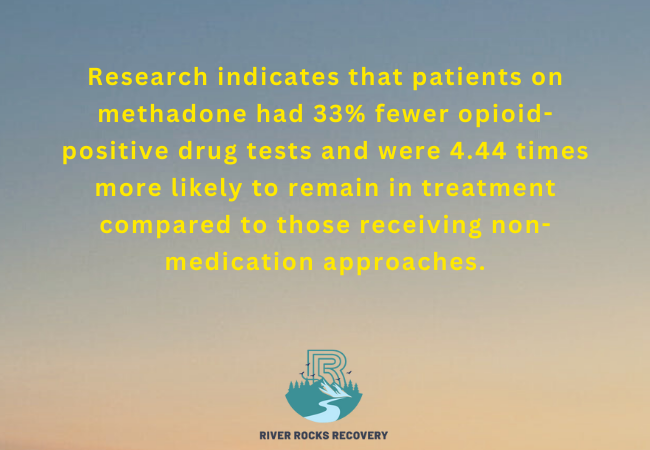Addiction is a powerful, chronic disease that doesn’t simply go away with willpower. It requires structured treatment, long-term management, and in many cases, a combination of behavioral therapy and medications. For people struggling with opioid, alcohol, or stimulant addiction, Medication-Assisted Treatment (MAT) offers a clinically proven path to recovery that balances brain stabilization with comprehensive behavioral support.
At River Rocks Recovery, we are proud to offer MAT as a central component of our addiction treatment programs in Ohio. Backed by medical science and individualized for each client’s needs, MAT provides relief from physical cravings, helps manage withdrawal symptoms, and enables individuals to focus on the psychological work of recovery.
What Is Medication-Assisted Treatment (MAT)?
Medication-Assisted Treatment (MAT) is an integrated approach that uses FDA-approved medications alongside evidence-based counseling and therapy to treat substance use disorders (SUDs). MAT is most commonly used to treat:
- Opioid Use Disorder (OUD) – Includes heroin, fentanyl, and prescription opioids.
- Alcohol Use Disorder (AUD) – Chronic alcohol dependence and binge drinking.
- Stimulant Use Disorders – Emerging treatments for methamphetamine and cocaine dependence.
MAT is not a “quick fix” or a substitute for drug use. Instead, it is a long-term management tool that corrects the chemical imbalances in the brain caused by prolonged drug or alcohol use, helping individuals feel normal again without experiencing withdrawal or overwhelming cravings.
How MAT Works
MAT functions on two levels:
- Physical Support: MAT medications reduce or eliminate withdrawal symptoms and prevent intense drug cravings.
- Psychological Support: With physical symptoms under control, clients can actively participate in therapeutic treatment programs, such as cognitive behavioral therapy (CBT), trauma therapy, and relapse prevention.
MAT is NOT replacing one addiction with another.
Instead, it is a strategic, medically supervised approach to give individuals stability, improve retention in treatment programs, and support brain recovery.
Common MAT Medications and Their Roles
For Opioid Addiction
- Buprenorphine (Suboxone®, Subutex®): Reduces cravings and withdrawal by partially activating opioid receptors.
- Methadone: A long-acting full opioid agonist administered under supervision; blocks euphoric effects of opioids.
- Naltrexone (Vivitrol®): An opioid antagonist that blocks the effects of opioids and reduces cravings (available in injection and pill forms).
For Alcohol Addiction
- Disulfiram (Antabuse®): Causes an adverse physical reaction when alcohol is consumed.
- Naltrexone: Reduces pleasure associated with alcohol consumption and cravings.
- Acamprosate (Campral®): Stabilizes brain chemistry after alcohol withdrawal and reduces the urge to drink.
For Stimulant Use (Meth, Cocaine)
There are no FDA-approved medications yet, but medications like bupropion and naltrexone are being studied in combination with behavioral therapies for managing cravings and depression.
Benefits of Medication-Assisted Treatment in Rehab
1. Increased Retention in Treatment
Clients using MAT are more likely to stay in treatment longer, which leads to better recovery outcomes.
2. Reduced Risk of Overdose
Especially for opioid users, MAT significantly reduces the risk of fatal overdose, making it a life-saving intervention.
3. Stabilization of Brain Chemistry
MAT restores balance to dopamine pathways, allowing individuals to regain control of emotions, judgment, and decision-making.
4. Reduced Criminal Activity and Drug Use
Studies show MAT leads to reduced illicit drug use, fewer legal problems, and improved social functioning.
5. Better Engagement in Counseling
With cravings and withdrawal symptoms under control, clients can fully engage in therapeutic work, including trauma healing, relapse prevention, and emotional regulation.
Overcoming Myths and Misconceptions About MAT
Despite its effectiveness, MAT continues to face stigma and misunderstanding. Let’s break down the most common myths:
Myth 1: “MAT is just substituting one drug for another.”
Fact: MAT medications do not produce a high when taken as prescribed. They normalize brain function and allow patients to live, work, and participate in therapy.
Myth 2: “You’re not really clean if you’re on MAT.”
Fact: Recovery isn’t about abstinence alone—it’s about reclaiming your health, relationships, and purpose. MAT supports that recovery and often saves lives.
Myth 3: “MAT is a short-term solution.”
Fact: MAT can be used short-term or long-term depending on the individual’s progress and needs. The length of treatment is individualized and can evolve with time.
Myth 4: “MAT isn’t effective for meth or cocaine.”
Fact: While no single FDA-approved MAT exists for stimulants yet, supportive medications combined with behavioral therapy show increasing success in reducing cravings and relapse.
By debunking these myths, River Rocks Recovery helps clients and families feel empowered and educated when considering MAT.
MAT in Action at River Rocks Recovery
We integrate MAT into every level of care offered at our Addiction Treatment Center in Ohio:
- Opiate Rehab Treatment in Ohio: MAT reduces relapse rates for heroin, fentanyl, and painkiller users.
- Meth Rehab Treatment in Ohio: MAT options are being incorporated alongside behavioral therapies to enhance outcomes.
- Partial Hospitalization Program (PHP): Offers daily structure, MAT oversight, and clinical therapy.
- Intensive Outpatient Program (IOP): Combines MAT with flexible, part-time therapy sessions.
- Outpatient Program (OP): Provides ongoing MAT and counseling for clients transitioning back to daily life.
Our team of addiction specialists, medical staff, and therapists work closely to create a personalized MAT plan for every client, ensuring the highest standard of care and support.
Conclusion
Medication-Assisted Treatment is not about masking addiction—it’s about reclaiming your life, restoring your health, and creating space for emotional healing and behavioral transformation.
At River Rocks Recovery, we know that real recovery requires more than just willpower. MAT can be the crucial support system that enables individuals to finally gain stability and fully participate in their recovery journey. Call River Rocks Recovery today at 888.905.6281 to learn more about our MAT programs and full-service addiction treatment in Ohio. Recovery begins with the right tools—let’s build a path forward together.
FAQ About Medication-Assisted Treatment (MAT)
What is Medication-Assisted Treatment (MAT)?
MAT is a clinically proven treatment approach that combines FDA-approved medications with counseling and behavioral therapies to treat substance use disorders such as opioid, alcohol, and (emerging) stimulant addictions.
What types of addiction does MAT treat?
MAT is most effective in treating:
-
Opioid Use Disorder (OUD) – including heroin, fentanyl, and prescription opioids
-
Alcohol Use Disorder (AUD)
-
Stimulant Use Disorder (e.g., methamphetamine) – though medications for this are still emerging
What medications are used in MAT?
-
Opioid addiction: Buprenorphine (Suboxone®), Methadone, Naltrexone (Vivitrol®)
-
Alcohol addiction: Disulfiram (Antabuse®), Naltrexone, Acamprosate (Campral®)
-
Stimulants: No FDA-approved MAT yet, but medications like bupropion and naltrexone are showing promise in studies
Will MAT make me feel high or become addicted to another drug?
No. When taken as prescribed and under medical supervision, MAT medications do not produce a high and are not addictive in the same way as illicit substances. They are designed to stabilize brain function and reduce withdrawal symptoms.
Is MAT used alone, or do I still need therapy?
MAT is most effective when combined with therapy. At River Rocks Recovery, clients receive individual counseling, group therapy, and relapse prevention planning alongside their MAT regimen.
How long does MAT last?
The duration of MAT depends on each individual’s needs. Some may use MAT short-term during detox, while others benefit from long-term maintenance. Your treatment plan is customized based on your health, history, and recovery goals.
Can I participate in MAT while working or living at home?
Yes. MAT is offered through multiple levels of care, including:
This allows clients to receive support while maintaining work, family, or school commitments.
Where can I find MAT programs in Ohio?
River Rocks Recovery offers MAT-integrated programs as part of our comprehensive addiction treatment approach. Whether you’re seeking help for opioids, alcohol, or meth, we’re here to support your journey.





























